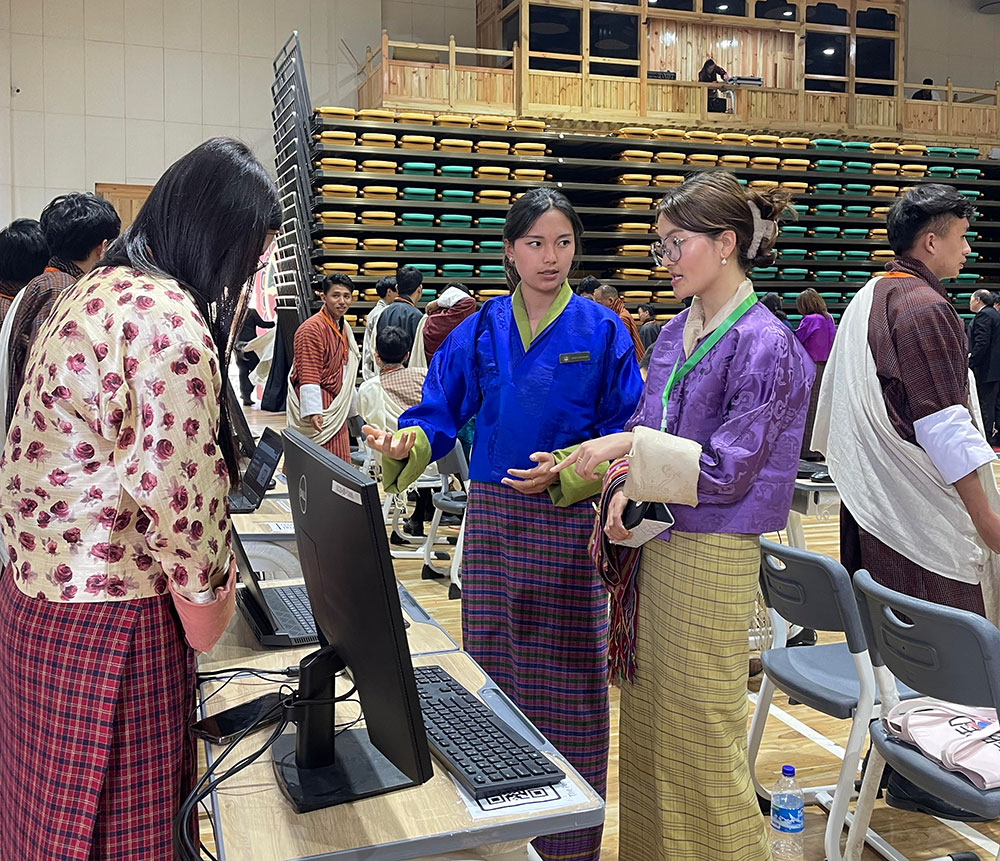
GCIT students create projects to tackle real-world problems
There is a solution for parents concerned about where their children will be placed when they join the Gyalsung programme. A group of Gyalpoizhing College of Information Technology (GCIT) students, found the solution using advanced technology like full-stack applications.
The Gyalsung smart allocation system, developed by the students, automates student placement into four Gyalsung academies based on their Class XII marks, streamlining the process for academy officials.
Norbu Dorji and his group collaborated with Gyalsung and created the system that will assist the Gyalsung programme to sort the enrolled students in the academy efficiently without needing it to be done manually.
This system was among the 39 projects, 20 projects by third-year students and 19 by final year students showcased at an event on June 3. Final year projects were developed in collaboration with different organisations and government departments including Gyalsung, National Land Commission, thromdes and DHI among others.
The students created their products using Artificial Intelligence (AI) and Block chain.
A group of final year students created the Parking.bt, a mobile application, partnering with Phuentsholing Thromde, to improve car parking monitoring systems from manual to digital, helping to improve efficiency.
The team shared the thromde faced problems of lack of records of data and transaction, people other than the parking fee collector collecting the parking fee, drivers’ reluctance to pay the fee charged and time consumed for the whole process.
The project has two applications, one for the driver and another for the fee collector. The driver can check available parking space, park and make payment. The fee collector will be notified when the vehicle is leaving the parking lot, and they can choose what payment method the driver wants and confirm the payment. They also have a website to keep an eye on the revenue they make.
Students worked on their project for the final semester, which was graded and examined by their clients and examiner. Lecturer of GCIT, Karma Cheki, said some of the partners approached the college while the college approached others to create the projects.
A team in collaboration with the National Land Commission (NLCS) created the NLCS smart appointment system, featuring client and admin dashboard. Users can schedule appointments by specifying date, time, location, department, and format (virtual or in-person).The system allows cancellations and rescheduling, with notifications sent through dashboards and e-mails.
A group of third-year students built a working prototype of an AI sign language translator to bridge communication gaps. Learning about the challenges faced by deaf students at Wangsel Institute, Paro. The system translates signs into text and voice. Ashish Nepal, one of the members, said their system captures the signer through a camera, and AI deciphers gestures and expressions. Recognised signs are displayed as text and spoken aloud. An emergency feature allows users to call for help with a pre-programmed message to a guardian’s WhatsApp.
Another group of third year students created GovChain using blockchain. This system aims to create a decentralised and transparent decision-making process. Inspired by voting methods in parliaments, GovChain can store discussion topics, voting details, and the number of votes cast on a specific day. Team members highlighted the use of the secure and tamper-proof Ethereum blockchain to store centralised data.
One group of third year students created Animal Detection using AI. Their system helps to detect any six wild animals including elephants, monkeys, wild boar and others using the sound system when they detect it through the camera, the sound system helps alert the people nearby the presence of the wild animals.
Karma Cheki said the plan is to float the final year’s project to companies and the government departments by the end of this month.












